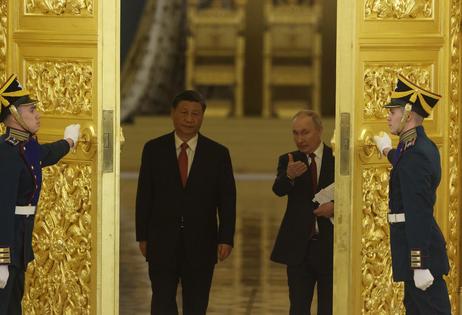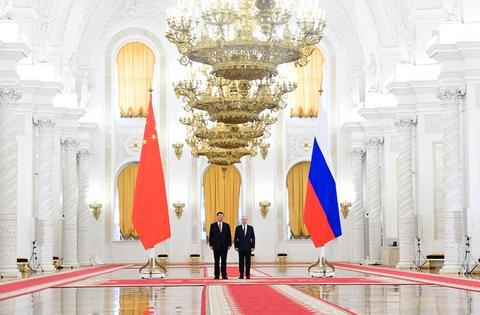The view from Moscow and Beijing: What peace in Ukraine and a post-conflict world look like to Xi and Putin
Published in Political News
Just a few days after being branded a war criminal in an international arrest warrant, Russian president Vladimir Putin was talking peace with his most important ally, Chinese president Xi Jinping.
The setting for the get-together was the late fifteenth-century Faceted Chamber, the ornate throne room of Muscovite grand princes and czars. The main topics of discussion were fittingly grandiose: How should hostilities in Ukraine end? And after the war is over, how should the international security system be reshaped?
The reaction of many in the West to the proposals put forward by China and discussed with Russia has been notably suspicious of intentions. U.S. Secretary of State Antony Blinken warned the world not to be “fooled by any tactical move by Russia, supported by China … to freeze the war on its own terms.”
Such sentiment is understandable. Putin launched a brutal, unprovoked war in Ukraine. Amid the heightened emotional environment of missile attacks on civilians, horrific atrocities against ordinary citizens and deportation of children from Ukraine, even a cool evaluation of ways to end the fighting, declare a cease fire, and begin talks by the belligerents has led to accusations of appeasement. And the peace plan put forward by China on Feb. 24, 2023 and discussed with Putin during a March 20-22 meeting in Moscow has been criticized as overly vague and lacking concrete suggestions.
In such circumstances, it can be difficult to consider what the interest of the other side might actually be in bringing the killing to an end, and their sincerity of any purported efforts to do so.
But as a historian, I ask, what does the world look like from the other side? How has the run up to the war and the war itself been understood by Russia and China? And what do Xi and Putin envision a post-conflict world to look like?
The rulers of both Russia and China see the West-dominated “rules-based international order” – a system that has dominated geopolitics since the end of the Second World War – as designed to uphold the global hegemony of the United States.
The two men’s stated preference is for a multilateral system, one which would most probably result in a number of regional hegemons. This would include, to be sure, China and Russia holding sway in their own neighborhoods.
Xi put the matter rather gently during his Moscow trip: “The international community has recognized that no country is superior to others, no model of governance is universal, and no single country should dictate the international order. The common interest of all humankind is in a world that is united and peaceful, rather than divided and volatile.”
Reflecting his more street tough style, Putin was more blunt. Russia and China “have consistently advocated the shaping of a more just multipolar world order based on international law rather than certain ‘rules’ serving the needs of the ‘golden billion’,” he said, referencing a theory that holds that the billion people in the richest countries of the world consume the greatest portion of the world’s resources.
Continuing in this vein, Putin said the “crisis in Ukraine” was an example of the West trying to “retain its international dominance and preserve the unipolar world order” while splitting “the common Eurasian space into a network of ‘exclusive clubs’ and military blocs that would serve to contain our countries’ development and harm their interests.”
Beijing appears intent to play the role of negotiator-in-chief in this transition to a multipolar world order.
After its success shouldering aside the United States and brokering a rapprochement between Iran and Saudi Arabia, China has turned its attention to Ukraine.
With its peace proposal on Ukraine, China has deftly established certain principles to which other nations would eagerly subscribe.
“The sovereignty, independence and territorial integrity of all countries must be effectively upheld. All countries, big or small, strong or weak, rich or poor, are equal members of the international community,” holds the first principle in language that would be hard to object to.
But those anodyne sentences point in two directions at once. Upholding sovereignty appears, at first, to be aimed at Russia a year after it had so clearly violated the sovereignty of neighboring Ukraine. But the principle also can be read to include the conflict over Taiwan, which is recognized by Beijing and some other states, as a part of China. It is perhaps no accident that the plan’s wording come as the U.S., which officially recognizes China’s claim to Taiwan, has toughened its stance, vowing to defend the island should it be invaded. To Beijing, the United States appears intent on turning a rival, China, into an enemy.
Nations, China asserts, have the right to enhance their security but not at the expense of others. This principle echoes directly one of Putin’s most frequently expressed reasons for the conflict with Ukraine: the expansion of NATO into Eastern Europe and the alliance’s promise to expand further by admitting Georgia and Ukraine. In Putin’s view, such NATO encroachment is an existential threat to Russia’s security interests.
But the Chinese plan also rejects Putin’s nuclear saber-rattling: “The threat or use of nuclear weapons should be opposed.”
Meanwhile, the Chinese strongly insist on the need for an immediate cease-fire and the start of negotiations, a call that Washington vehemently rejected as a concession that amounted to “diplomatic cover for Russia to continue to commit” war crimes.
Russia’s aims in the Ukraine war are simple enough to dissect, though they have been reduced after the effective Ukrainian resistance to the initial invasion.
Instead of taking over all of Ukraine, and perhaps setting up a puppet government, Moscow has been forced to accept limited territorial gains in the Donbas and the coastal crescent linking both the region and Russia with Crimea. Reduced though they are, such Russian goals are completely unacceptable to Ukraine and to the Western alliance – and, indeed, to all countries that accept that principle that international borders cannot be legitimately changed unilaterally by military force.
Although not clearly spelled out, this principle is even contained in the very first sentence of the Chinese peace plan: “Universally recognized international law, including the purposes and principles of the United Nations Charter, must be strictly observed.”
That notwithstanding, Putin has welcomed the intervention of China and the plan in general terms.
So what’s in this for Beijing, given that to many, the peace plan is already a non-starter?
The conflict in Ukraine is not only devastating to the two belligerents involved, but destabilizing for states around the world. In the short run, China may be benefiting from the war because it consumes attention and armaments from the West and diverts its gaze from East Asia. The U.S. “pivot to the east” – a planned refocusing from the Obama administration onward aimed at countering the perceived threat of China – has stalled.
But there is an argument that Xi is most concerned with China’s renewal of economic development, which would rely on less confrontational relations with Europe and the United States. Stability, both domestically and internationally, works to China’s economic advantage as a major producer and exporter of industrial goods. And Beijing is mindful that a slump in foreign demand and investment is hitting the country’s economic prospects.
As such, Beijing’s new role as peacemaker – whether in the Middle East or Eastern Europe – may indeed be sincere. Further, Xi may be the only person on the globe able to convince Putin to think seriously about a way out of war.
Standing in the way of peace, however, is not only the current intransigence of Russia and Ukraine. The United States’s long-held foreign policy aim of maintaining its “indispensable nation” status runs counter to Russia and China’s ambition to end American global dominance.
It presents two, seemingly insurmountable, rival ambitions.
This article is republished from The Conversation, an independent nonprofit news site dedicated to sharing ideas from academic experts. The Conversation has a variety of fascinating free newsletters.
Read more:
Ukraine war has exposed the folly – and unintended consequences – of ‘armed missionaries’
The Ukraine conflict is a war of narratives – and Putin’s is crumbling
Ronald Suny does not work for, consult, own shares in or receive funding from any company or organization that would benefit from this article, and has disclosed no relevant affiliations beyond their academic appointment.


























































Comments